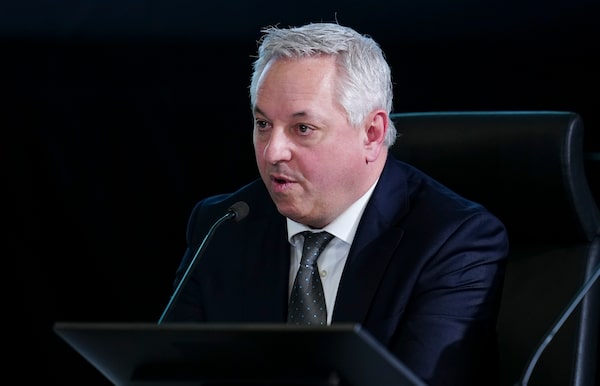
CSIS Director David Vigneault appears as a witness at the Public Inquiry Into Foreign Interference in Federal Electoral Processes and Democratic Institutions in Ottawa on April 4.Sean Kilpatrick/The Canadian Press
Now we know why Canada’s spy chief went into two meetings with Prime Minister Justin Trudeau and never uttered the Canadian Security Intelligence Service’s stark warnings that the government had to get its act together to combat foreign interference.
It was, according to CSIS director David Vigneault, because he had said such things to the Prime Minister so many times before.
The CSIS director was called back to the Foreign Interference Commission, where he had first testified last week, to settle questions about whether he had delivered the hard facts and blunt warnings about foreign interference that were in his speaking notes for the meetings. The Prime Minister’s aides, after all, had already told the inquiry they never heard them.
Had Mr. Vigneault, in fact, rung the alarm at the meetings?
The spy chief’s answer, in sum, was that he didn’t have to bother. It was old hat.
He’d said those things so often to the Prime Minister and his ministers that it was boilerplate. He was always telling people that hostile states wouldn’t shy away from interfering in Canada’s democracy, because it is “low risk and high reward,” he said, so much so that it had become CSIS parlance. In these meetings with the Prime Minister, he skipped the boilerplate and got down to specific business.
There are two remarkable things about this. One is the nature of the things Mr. Vigneault said he had told Mr. Trudeau over and over again. The other is that Mr. Trudeau’s aides testified they had never heard anything like it.
Mr. Vigneault’s speaking notes for two meetings, in October, 2022, and February, 2023, included stark statements not only about the existence of foreign interference in Canada but about the need for the government to get its head around it.
And Mr. Vigneault said he passed on similar messages many times. Messages like these, from his notes: “Better protecting Canadian democratic institutions against [foreign interference] will require a shift in the Government’s perspective and a willingness to take decisive action and impose consequences on perpetrators.” And this: “Until [foreign interference] is viewed as an existential threat to Canadian democracy and governments forcefully and actively respond, these threats will persist.”
In other words, foreign interference is going to be a problem unless you take much stronger action. These messages were wake-up calls. But Mr. Trudeau’s most senior political aides said they had never heard any of it. Not in those meetings and, when it comes to the stark warnings, not ever.
“We’ve never heard language like the stuff that is in this document,” Jeremy Broadhurst, a senior adviser to the Prime Minister, told the commission Tuesday, referring to Mr. Vigneault’s speaking notes from the October, 2022, meeting.
The gap between the spy chief and the Prime Minister and his aides is still there. After Mr. Vigneault’s testimony, it seems larger.
Mr. Vigneault took the unusual step of asking Commissioner Marie-Josée Hogue, who is leading the inquiry, to let him make his own statement after his testimony. He used the opportunity to laud the professionalism of CSIS and its agents. It was hard not to see that as a response to Mr. Trudeau and his aides, who had cautioned that sometimes CSIS makes mistakes and might not understand how politics and elections work.
Mr. Vigneault’s testimony makes it clearer than ever that CSIS saw foreign interference as a much bigger problem than the Prime Minister, and the PMO. Mr. Trudeau didn’t hear warnings in the meetings on Oct. 27, 2022, and Feb 23, 2023, but Mr. Vigneault indicated the Prime Minister had heard them many times.
There were occasions when some of the matter-of-fact statements in Mr. Vigneault’s documents were less stark than they seemed.
The CSIS director’s speaking notes said that China “clandestinely and deceptively interfered in both the 2019 and 2021 general elections,” while Mr. Trudeau has played down the impact of foreign interference. Mr. Vigneault said both perspectives are true: China was involved in attempts to interfere, but those efforts did not have a substantial effect on the elections’ outcomes.
But Mr. Vigneault said yes, he told the Prime Minister that Canada is lagging its Five Eyes intelligence allies in countering foreign interference. Yes, he said, the government should find ways to make hostile countries feel like they might pay for interfering in Canada’s democracy. Yes, he warned that the government has to get its act together to respond forcefully.
For Mr. Trudeau, that has made things worse. Mr. Vigneault didn’t just respond to a he-said-she-said disagreement about whether the Prime Minister was told. He said he’d told the Prime Minister so many times it didn’t need to be said again.